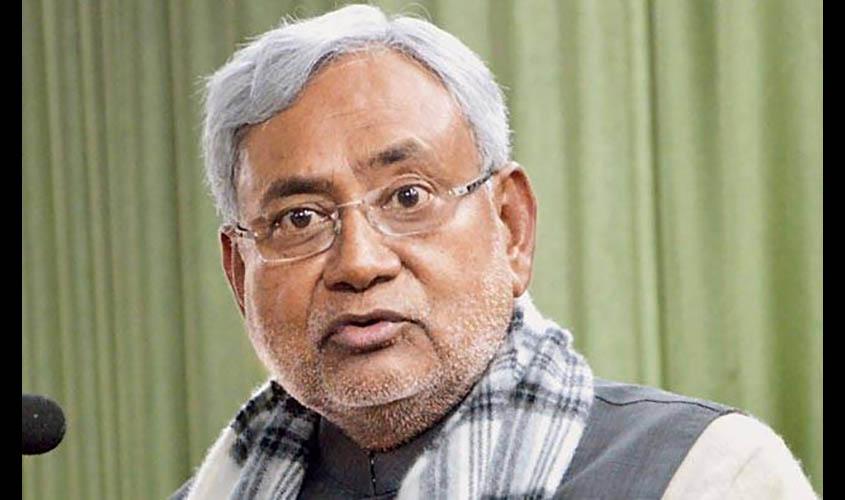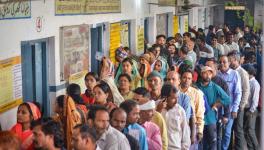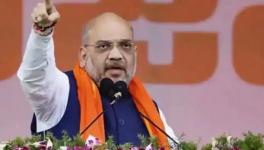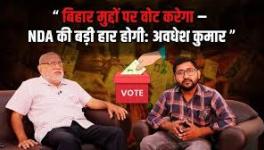Nitish’s Prohibition Policy: A Horror Worse than Emergency

Nitish Kumar
Long before the lockdown compelled an estimated 32 lakh migrant labourers to return to Bihar and floods ravaged an additional 80 lakh people, Chief Minister Nitish Kumar’s ban on liquor had turned into a horror story even worse than the Emergency was for Biharis. In those darkled years, between 25 June 1975 and 21 March 1977, a total of 1.11 lakh people were imprisoned countrywide under various preventive detention laws, according to the Shah Commission which probed the excesses committed during the Emergency.
The ban on liquor in Bihar came into force in April 2016. By November 2019, a whopping 1.67 lakh people had been arrested for flouting the law governing prohibition. By then also, around two lakh prohibition-related cases, including 40,000 bail applications, were awaiting disposal in the Patna High Court.
When Praveen Kumar and Vijay Raghavan published their paper, Undertrial Prisoners in Bihar: A Study of Liquor Ban Arrests, the number of arrestees under the prohibition law stood at 1.50 lakh. Of them, the authors said 70% belonged to the Other Backward Castes and Dalit communities, and 88% were categorised as economically marginalised. Their poverty disabled them from accessing legal assistance or providing sureties for bail. They languished in jail for months.
Kumar and Raghavan retell some of these tragic stories. For instance, Shivendra Sah, a 35-year-old daily wage earner, was arrested for consuming liquor and disrupting traffic. Imagine the trauma of Sah’s mother, who had no inkling where her son had disappeared. Sah spent 21 months in jail before he was released on PR (Personal Recognisable) bond by the judge.
Or take the 45-year-old Mukesh Dom, a sewage cleaner, who was arrested in November 2017. Kumar and Raghavan write, “Mukesh claimed that to do such jobs and to survive amidst such pathetic conditions, he had to drink before getting into sewage drains.” Mukesh spent 11 months in prison before he too was released on PR bond.
Such stories make it bewildering why the national media has failed to train the spotlight on the Congress’s declaration that it favoured a review of Bihar’s prohibition policy. Regardless of whether the Mahagathbandhan or Grand Alliance, of which the Congress is a member, comes into power, there is a compelling case to lift the ban on liquor in Bihar. The prohibition policy has become an eloquent example of the havoc a paternalistic state can create for citizens whom it wishes to reform.
Indeed, Kumar’s prohibition policy was in response to the pressure from women, who protested against the rise in consumption of liquor, smashed bottles and closed down vends. They said the easy availability of alcohol was ruining families; the men prone to spending money on drinks than, say, on children’s education or more nutritious food. They also claimed that inebriated men had become a threat to women’s safety, at home and in the public arena.
The irony, however, is that Kumar was himself responsible for the rise in Bihar’s liquor consumption. In 2007, Kumar liberalised excise laws for issuing licences to open liquor shops. The number of liquor shops jumped from 3,436 in 2006-2007 to over 5,467 in 2012-2013. This growth was largely achieved through rural Bihar—the number of liquor vends there increased from 779 in 2006-2007 to 2,360 in 2012-2013. The spurt in liquor sales was the reason why Bihar’s excise revenue ballooned from Rs 525 crore in 2007-2008 to Rs 2,765 in 2012-2013.
The adverse reaction of women to Kumar’s liquor policy had him swing to the other extreme. Not only did he ban liquor, the provisions of the Bihar Prohibition and Excise Act, 2016 were made stringent. For instance, a mandatory jail term was prescribed for a person caught tippling for the first time. Two years later, the Act was amended to provide a fine of Rs.50,000 or a jail term of three months. But it did not substantially help matters. The poor caught drinking could not, obviously, pay the fine and were dumped in jail. Before the Act was amended, habitual drinkers could be barred from residing in their districts from two to six months; an entire family could be arrested in case one of its members was nabbed drinking; anyone drinking or storing liquor could have his or her house seized.
The softening of the Act did not significantly stem the tide of terror sweeping across Bihar. It has already become a habit with the police to exploit the Act for extorting money and tormenting citizens. Worse, bootlegging became rampant, with liquor sold at twice or thrice the selling price. In other words, a session of drinking was costing more than it did earlier. The savings accruing to women because of prohibition was eroded.
It is also debatable whether the ban on liquor made women feel safer, contrary to the Bihar government’s claims. Crime against women, according to the National Crime Records Bureau, dipped slightly, from 13,904 incidents in 2015 to 13,400 incidents in 2016. But this dip was soon reversed—crime against women rose to 14,711 incidents in 2017, then to 16,920 incidents in 2018, and 18,585 incidents in 2019.
However, incidents of “cruelty by husband or his relatives” have been falling consistently, from 3,776 incidents in 2017 to 2,397 in 2019. Yet it is moot whether Bihari husbands are less cruel to their wives because they are drinking less—or because of other social factors, including growing social awareness.
Media stories do show that women are no longer enamoured of Kumar’s prohibition policy, largely because of the rampant bootlegging. The change in their mood does indicate the folly of combating alcoholism with a ban on liquor than thinking of a more sensitive social intervention. There is also the issue whether or not the choice to drink should be left to the individual, particularly in democracies.
The right to choose was ferociously debated in a discussion on whether to include Article 47, which recommends prohibition but does not make it mandatory, in the Constitution. Among those who opposed Article 47 was BH Khardekar, an independent member from Kolhapur, Maharashtra. He quoted political theorist Harold Laski’s view that “prohibition goes against the very grain of personal liberty”. Khardekar said the young should not be encouraged to drink, but it is better that they learn from their mistakes. The idea of liberty can only advance when people learn to behave responsibly, he argued.
Khardekar pointed out that a blanket-prohibition policy would deny precious revenue to the state, which could be utilised for building social and educational infrastructure. Besides, it will lead to bootlegging, he predicted, citing the experience of the United States to bolster his point.
Khardekar’s canvas of criticism was vast. For instance, he said, “Then Sir—I am not going to be frivolous here—but…I may tell you just compare the two things—some friends having discussion may be in the evening or night quite seriously over a glass of butter-milk and as against that an innocent but intellectual discussion over a glass of wine or even beer.” Khardekar said people like Dr BR Ambedkar enjoyed reading academic tomes, others loved novels, and a few enjoyed playing the piano. “There are some who like to have a glass of wine or beer,” he said.
Conscious that his arguments might be dubbed elitist, Khardekar referred to mill-workers who worked hard all day and like to have a glass or two of toddy in the evening. “Why should you deprive him of that? Sir, I would want you to consider the solace and the little comfort that he gets,” Khardekar said. He quoted The Times of India editor to say, “There are things other than liquor that go to the head and power is one. Let not the majority suffer from it.”
Supporting Khardekar was Jaipal Singh, who captained the Indian hockey team in the 1928 Olympics. He claimed alcohol was an inextricable element of the cultural-religious and economic life of the Adivasis. “In West Bengal, for instance, it would be impossible for paddy to be transplanted if the Santhal did not get his rice beer,” he said. And then, amidst jeers in the Assembly, Singh declared, “Whether you put in the Constitution or not, I am not prepared to give up my religious privileges.”
Singh was born in what is now Jharkhand, which, until two decades ago, was in undivided Bihar. Perhaps Kumar should have heeded Singh, who advised, “Excess in everything is wrong… If you eat too much rice, it is bad for you. But, if you take anything in its right quantity, it is good for you.” He said liquor drunk in excess did nobody any good, but then also warned, “Let us remember that we should not be hasty in putting into the Constitution anything which is going to work for more bitterness than there is already.”
Bihar is certainly bitter over Kumar’s prohibition policy. A tippler arrested for quaffing a quarter does not a democracy make.
The author is an independent journalist. The views are personal.
Get the latest reports & analysis with people's perspective on Protests, movements & deep analytical videos, discussions of the current affairs in your Telegram app. Subscribe to NewsClick's Telegram channel & get Real-Time updates on stories, as they get published on our website.
























